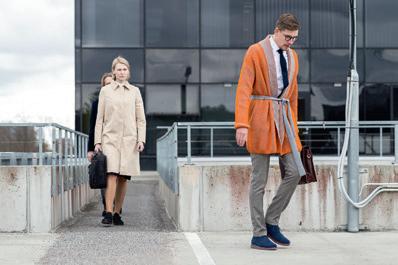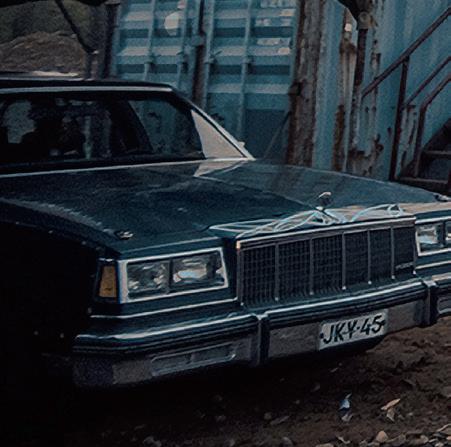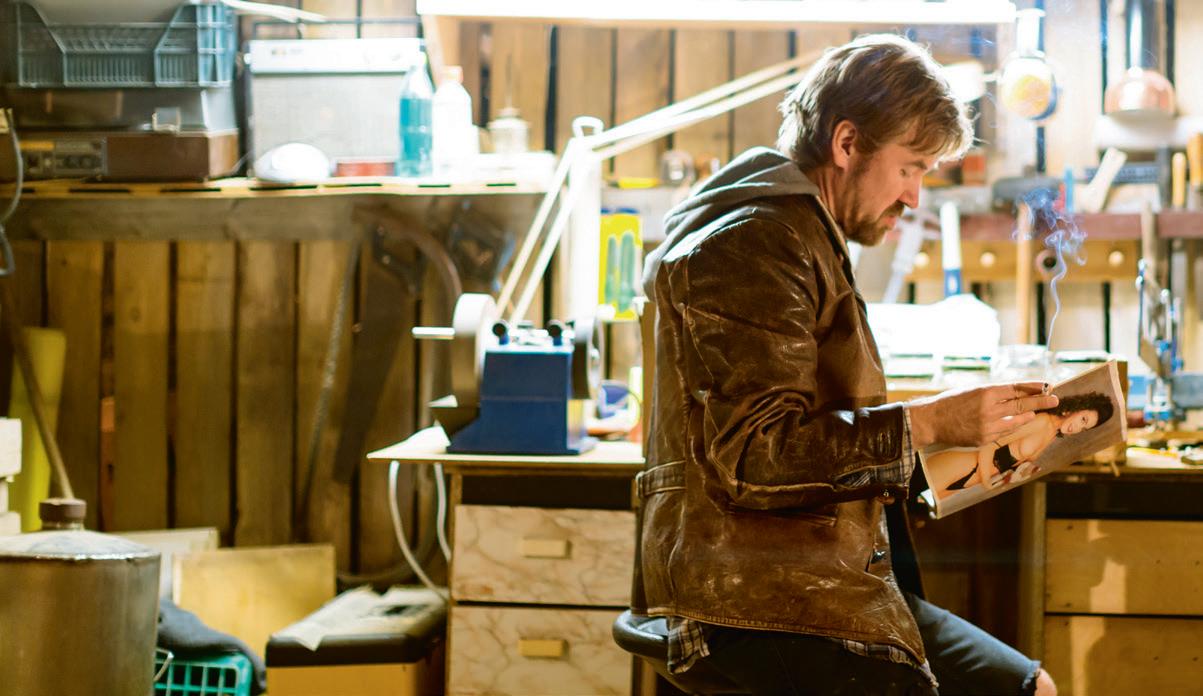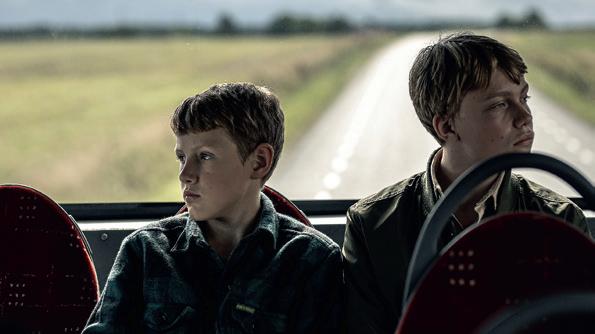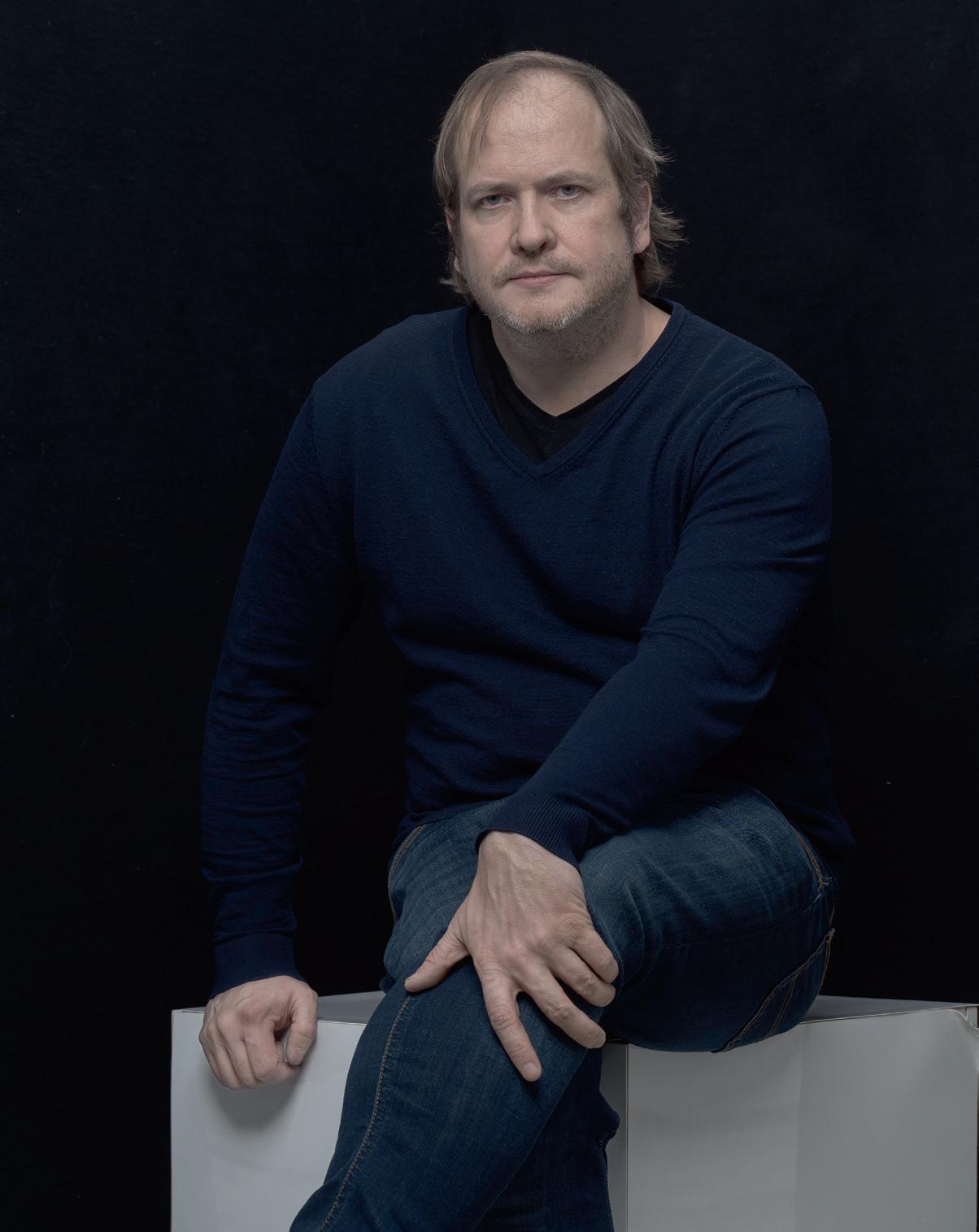
9 minute read
DIRECTOR Kaupo Kruusiauk
Working Man A
Debut feature Sandra Gets a Job directed by Kaupo Kruusiauk is a tragicomical film about job hunting and personal fulfilment. We will have a talk with Kaupo about the background of the film and about work culture in general.
By Aurelia Aasa Photo by Viktor Koshkin
Kaupo, the protagonist Sandra in your feature is a woman of few words, she does not perceive the social code and does not belong to any particular group – shortly, she is a bit weird. When she loses her job, she will be extremely confused. How did such a character come to being? It was my idea from the beginning to use a protagonist who would seem just like from another world in order to introduce extra nuances and to emphasize the story. The complicated character, coming from the universe of science, finds jumping to another field disturbing and the conflict grows deeper. When I started to write the screenplay, I had actress Mari Abel in mind immediately and I was really happy that Mari has come along with all ideas – since for actors this is definitely a hard nut to crack. It is always easier to follow the realistic approach. We knew each other before and mutual trust was certainly helping a lot.
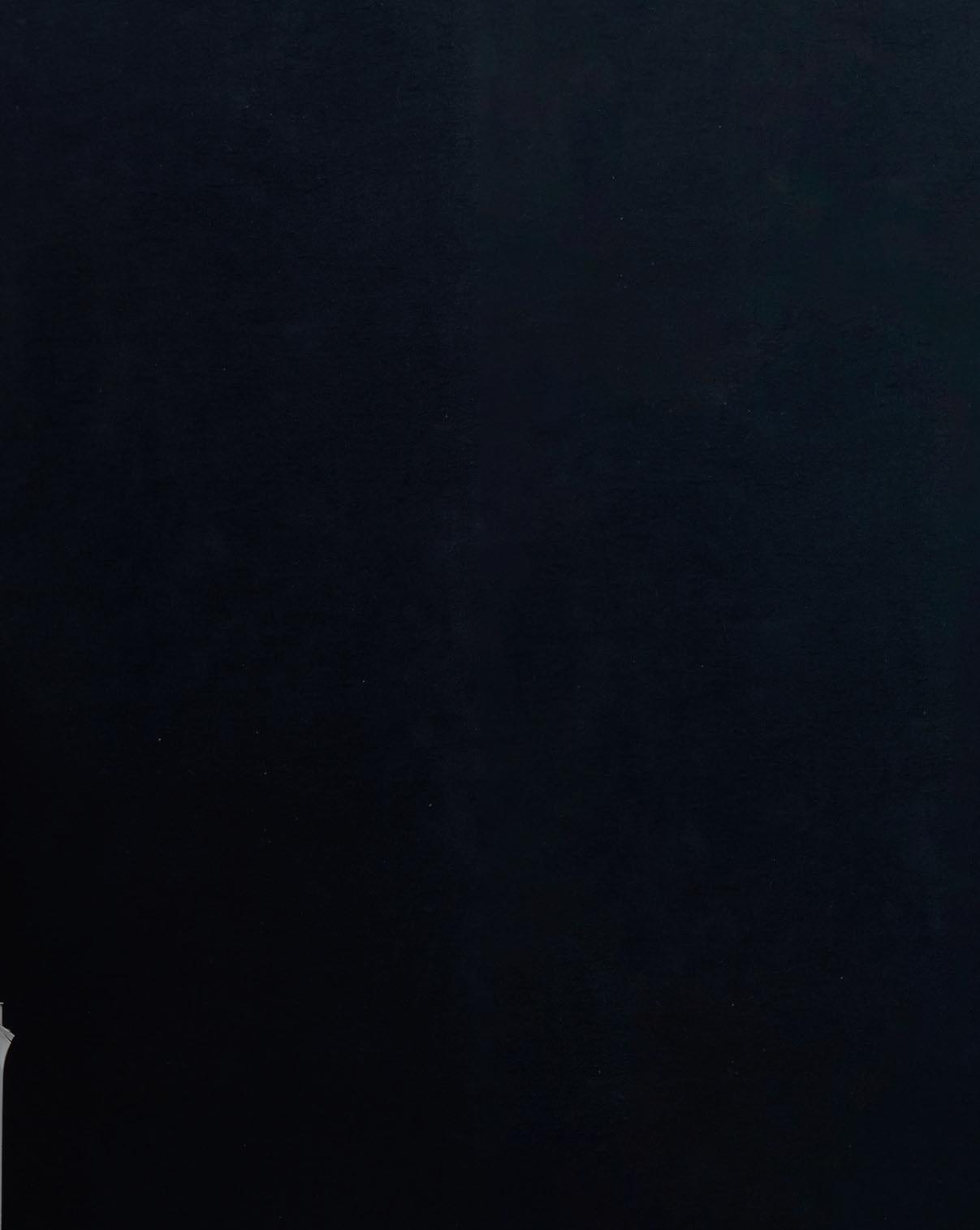
Sandra is a scientist. You have no direct relationship with science. But you are quite a chess player yourself. That’s true. And the protagonist’s basic impulses are somewhat resonating with chess. I have been familiar with chess since young age; people in that field do not differ from scientists that much. Playing chess includes frequent research and self-improvement. And just like Sandra, so can the chess community be sometimes strange.
How did you come up with the idea for the film? It rather came quite naturally to me – before the film school I worked in an office in another field, and I included elements from that era in the film. So I got the idea rather by chance – it seems to be an intriguing point of view in the process of job hunting. Similar films often use some kind of social approach, my purpose was to contemplate the diverse roles, identity and self-searching of an individual. I wanted the film to become a somewhat melancholy blend of the comical and the absurd.
During the process on job hunting Sandra is struck by the worlds of corporative enterprises as well as the startuppers – thus jumping into the large part of today’s work environment. Was the mapping of the contemporary work environment one of your missions? It was definitely on my mind – although when I was writing the story, my idea was not to define various work environments but to reflect different situations in various professional fields so that the actor/ actress could practice diverse acting in various episodes not only from the psychological but also physical points of view.
And yet, this is somehow an ironic view to work environment. The startuppers compete in holding a plank position in their offices; and the giant corporations play psychological cat and mouse games. I hope that the comical element is present in this film. Perhaps I was inspired also by the feeling that there is so much faff in the world of employment – there are so many expressions and words that everyone is protecting their profession with. Thick walls of specialists are built, instead of trying to sum up everywith with a few words. And yet everyone is used to this situation, it is a social code. Sandra as a character reminds of an UFO who steps into the cliche-like situations.
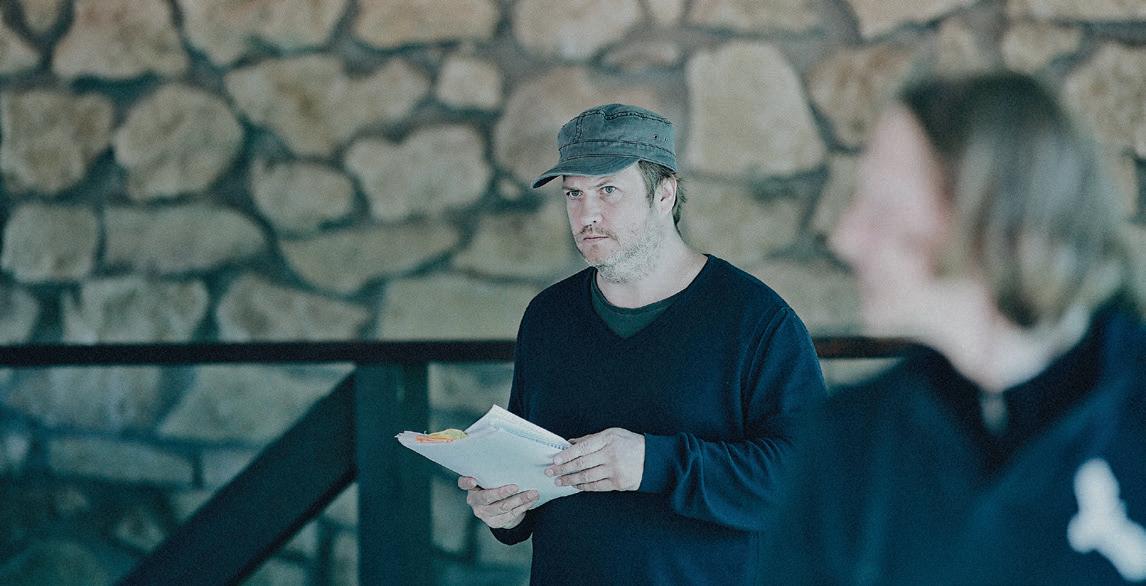
What kind of preparations did you make for the film? Did you have conversations with those who had lost their jobs? I spoke to people who had been job hunting for a long time. Perhaps the screenplay has even too much of job hunting in it, but I did not want a classical screenplay where the protagonist is unemployed looking for a job, and the next moment everything will be fine. The job hunt turns to a road movie where you start meeting various persons, one after another, but where collaboration never happens. Those who have been looking for a job for quite a some time confessed that it might be a long and complicated road. There are cases of public competition where the candidates have already picked out before the interviews are held. Despite the profession there are always a multiple stage competition. Finally one could ask whether the people really enjoy holding interviews and looking through presentations. We also did plenty of scientific study before filming. The laboratory where we are in the beginning of the film performs also scientific research in real life, also the dialogues in the film are science-centered. We listened to the scientific lectures with Mari Abel.
Did you see any bitterness when talking to the people searching for a job? Those whom I contacted had all finally found a job. I did not perceive bitterness but there was boredom. It must be taken into consideration that we started with the project during the times of an economic boom. It seemed that everyone would get employed. In current situation, the film meets an unexpectedly positive feedback – not only because the economic cooldown but job hunting is a very current issue right now and the role of scientists are in the focal point. Even the state support to the field of science is being increased.
I have the feeling that in the postCOVID world the film has acquired a new dimension. Besides the fact that science is becoming an increasingly important issue these days, many people have also lost their jobs and the work stuctures of many professions have transformed. When the virus hit, we had almost finished the film. Now it falls into a somewhat fertile ground which provides the film extra opportunities. Many people have lost their jobs today. Perhaps the working models have also changed. However, in this film the focus is on the old forms of working and the film is mainly set in offices.
Would you have approached differently as a director if the filming had coincided with the spread of COVID? Perhaps added some other ways of work? That is difficult to say since every filmmaker shows scepticism towards the expectations that everything should reflect current issues. Another thing is that people chatting via computer screens is not the most exciting phenomenon from the cinematographic point of view. (Laughing.) Maybe I should have put some people wearing masks somewhere in the film.
How has COVID-19 influenced your personal life? It has had quite a strong impact, especially during its first period last spring. The situation made us to stay put at home, and even if in the beginning it seemed it would offer me so much time for writing then all of this time was totally lost in the family-related commitments. I cannot say the time has supported creativity.
Workaholics are the central characters in your film. How would you describe your relationship with work? Filmmaker’s job is definitely not a nine to five one. Ideas are always with you, everywhere. During the spring lockdown I immediately started to search for a COVID-related documentary project to work on. I am not the best freelancer yet I cannot also stand the nine to five job. When I am actively generating new ideas then a bystander might have the feeling that I am doing nothing. After the brainstorming period I quickly write everything down. Filmmaking is often seen as a side job – something that should be made after hours. Unfortunately this is
Director Kaupo Kruusiauk and the cinematographer Sten-Johan Lill (below), actress Mari Abel as Sandra (on the right).
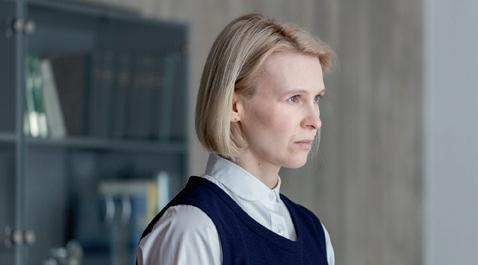
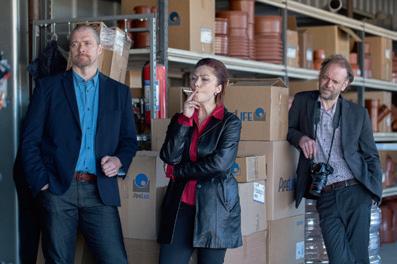
Ken Mürk Photo by
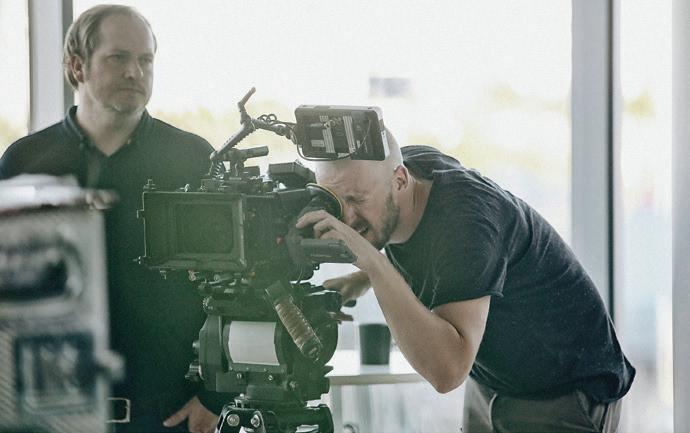
not the case – when you work full hours then you will be exhausted in the evenings and considering screenwriting as a side job won’t be a fruitful idea. Writing a screenplay is a demanding task, even if compared to other fields of work it may seem as something very simple.
In your films you have touched a lot everyday subjects. Recently, a short documentary about grass premiered in Estonia. In your portrait documentaries, you have observed people’s daily life. Sandra Gets a Job is also a story taken from daily life. What does inspire you in everyday life? There is rituality in daily life. I am not very practical-minded person myself and I enjoy looking these kind of people running around as a bystander. So I see that for many people such flow in daily reality matters a lot – it includes a moment of rituality. And at the same time, there is a somewhat comical and absurd element in all of that and I find it inspiring. I’d like to think about the importance of it – and it definitely is important to people.
Sandra Gets a Job is your first feature film. You have been mostly working with documentaries until now. During the process of directing a documentary it is important to observe, to flow with life. How did you apply your experience as a documentary filmmaker when working on a feature film? In my opinion, making documentaries helps a lot a feature filmmaker as well. This is often left unnoticed and people think that filmmakers of different genres must remain in their field. Even during the film studies it was emphasized that the feature film is the beginning and the end. I discovered the world of documentaries full of surprises after my studies. Documentary film offers a chance to observe real characters – to find out what they think and do, how people try to look better, to hide or emphasize something. I think that my experience in the field of documentaries helps to create more natural characters also in feature films and I can choose better which elements to transfer from the real world to the feature film. It’s not that you take the script and start writing down the characters, one by one. Filmmakers often want to use the elements of feature films also in documentaries, but it is taught that feature films should follow their own strict rules. I believe that feature films can be playful. What I really liked about Sandra Gets a Job is that we were able to create our own world. It is up to every viewer how to relate to it. I consider it really important that every feature film would be unique and not repeating a certain standard pattern. A distinctive system could be perceived in a feature film – including the vision of the director as well as other visions. And I was stubborn with this feature – first, the project was not financially supported but I continued working on the screenplay because of the feeling that I simply had to carry on with it. EF
SANDRA GETS A JOB
Sandra (Mari Abel) has a PhD in physics and she has spent most of her life working in labs. As a typical workaholic, she has sacrified both her social relationships and private life for her work. Sandra’s world collapses after getting a sudden notice of dismissal. She must start looking for a new job. Shortly, the socially insecure woman is challenged by several job interviews while experiencing the worlds of both casually dressed startuppers as well as sexist corporations.
